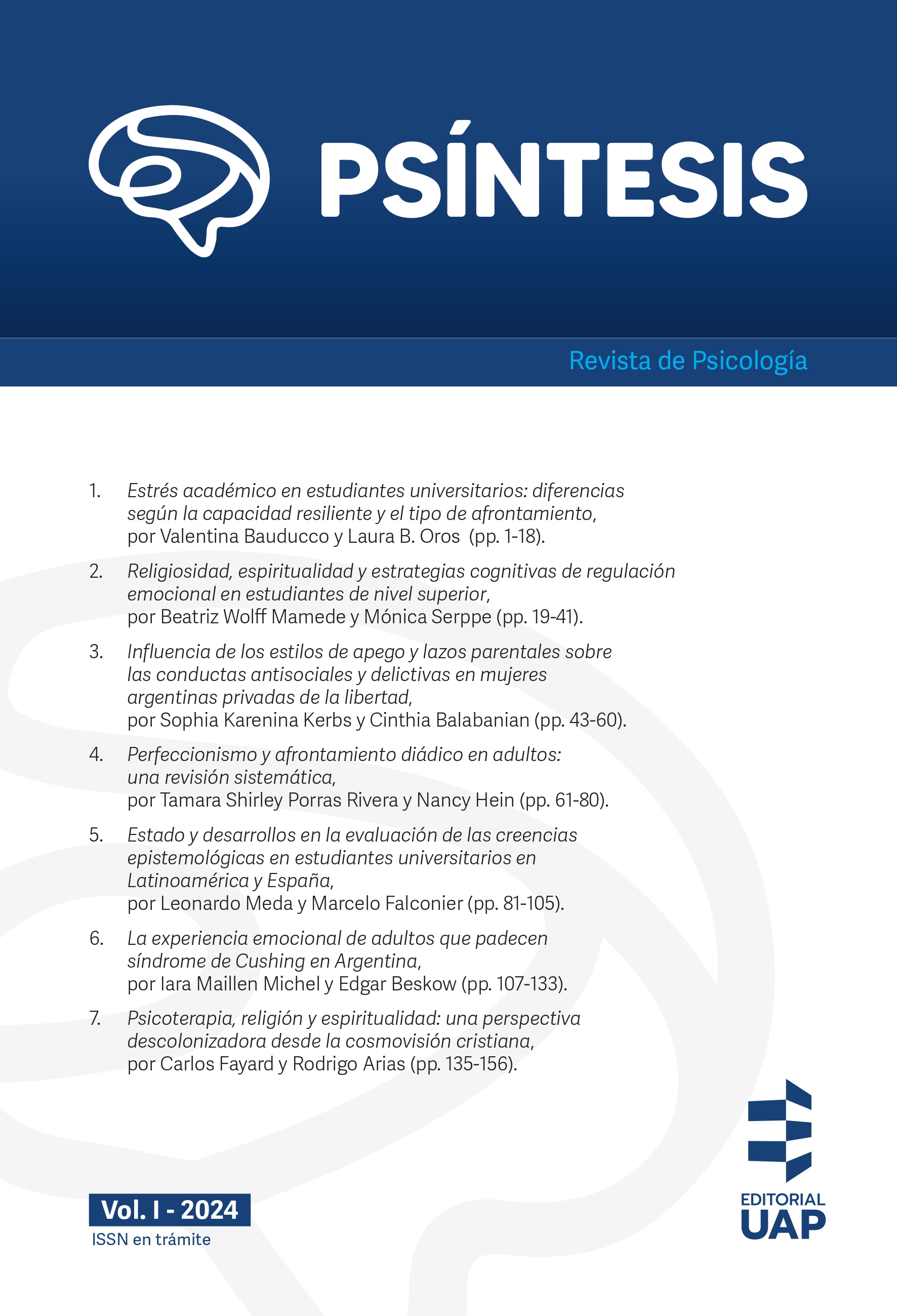Perfectionism and dyadic coping in adults: A systematic review
DOI:
https://doi.org/10.56487/gt6zkk34Keywords:
Multidimensional perfectionism — Dyadic coping — Relational coping — Perfectionism in a couple — Other-oriented perfectionism — Socially prescribed perfectionism — Self-oriented perfectionismAbstract
The objective of this review was to learn about studies of perfectionism and dyadic coping in adults and to analyze whether there is research that associates multidimensional perfectionism with dyadic coping in adults who are in a relationship.
This review included literature reviews that used psychometric instruments in experimental and quasi-experimental studies. Research conducted with samples of participants ranging in age from 18 to 78 years was also considered. The results suggest
that dimensions of perfectionism play a critical role in how couples cope with stress
and resolve conflicts. This provides evidence that depending on the dimension of
perfectionism that is highest, it can have mostly negative effects on dyadic coping.
Couples opt for negative strategies, increasing conflictive behaviors and not achieving adequate and positive coping in response to the difficulties. Understanding these
dynamics is essential to promoting healthy and satisfying relationships.
Downloads
References
Arjmand, A., Fallahchai, S. R. y Zarei, E. (2015). Perfectionism and forgiveness role in the prediction of marital conflict. Bulletin of Environment, Pharmacology and Life Sciences, 4(6), 133-139.
Berg, C. A. y Upchurch, R. (2007). A developmental-contextual model of couples coping with chronic illness across the adult life span. Psychological Bulletin, 133(6), 920-954. https://doi.org/10.1037/0033-2909.133.6.920
Bodenmann, G. (1995). A systemic-transactional conceptualization of stress and coping in couples. Swiss Journal of Psychology, 54(1), 34-49. (2008). Dyadic coping and the significance of this concept for prevention and therapy. Zeitschrift fur Gesundheitspsychologie, 16, 108-111. https://doi.org/10.1026/0943-8149.16.3.108
Bodenmann, G., Pihet, S. y Kayser, K. (2006). The relationship between dyadic coping marital quality and well-being: A two-year longitudinal Study. Journal of Family Psychology, 20(3), 485-493. https://doi.org/10.1037/0893-3200.20.3.485
Chemisquy, S. (2017). Las dificultades interpersonales de los perfeccionistas: consideraciones teóricas sobre el modelo de desconexión social. Revista Argentina de Ciencias del Comportamiento, 9(2), 77-92. https://doi.org/10.32348/1852.4206.v9.n2.16646
Coyne, J. C. y Smith, D. A. F. (1991). Couples coping with a myocardial infarction: A contextual perspective on wives’ distress. Journal of Personality and Social Psychology, 61(3), 404-412. https://doi.org/10.1037/0022-3514.61.3.404
DeLongis, A. y O’Brien, T. B. (1990). An interpersonal framework for stress and coping: an application to the families of Alzheimer’s patients. En M. A. P. Stephens, J. H. Crowther, S. E. Hobfoll, y D. L. Tennenbaum (Eds.), Stress and coping in later-life families (pp. 221-239). Hemisphere.
Dimitrovsky, L., Levy-Shiff, R. y Schattner-Zanany, I. (2002). Dimensions of depression and perfectionism in pregnant and nonpregnant women: Their levels and interrelationships and their relationship to marital satisfaction. The Journal of Psychology: Interdisciplinary and Applied, 136(6), 631-646. https://doi.org/10.1080/00223980209604824
Falconier, K. M. y Kuhn, R. (2019). Dyadic coping in couples: A conceptual integration and review of the empirical literature. Frontiers in Psychology, 10(571). https://doi.org/10.3389/fpsyg.2019.00571
Fernández, S. A., Freire, A. R. O., Aparicio F. M. del P. y García F. J. M. (2021). Dificultades interpersonales en las relaciones heterosexuales y pensamientos automáticos perfeccionistas en universitarios ecuatorianos. European Journal of Health Research, 7(1), 1-12. https://doi.org/10.32457/ejhr.v7i1.1389
Flett, G. L., Hewitt, P. L., Shapiro, B. y Rayman, J. (2001-2002). Perfectionism, beliefs, and adjustment in dating relationships. Current Psychology: A Journal for Diverse Perspectives on Diverse Psychological Issues, 20(4), 289-311. https://doi.org/10.1007/s12144-001-1013-4
Franchi, S. (2010). Estilo de personalidad perfeccionista y depresión. Perspectivas en Psicología, 13, 53-64.
Frost, R., Marten, P., Lahart, C. y Rosenblate, R. (1990). The dimensions of perfectionism. Cognitive Therapy and Research, 14(5), 449-468. https://sci-hub.se/10.1007/bf01172967
Haring, M., Hewitt, P. L. y Flett, G. L. (2003). Perfectionism, coping, and quality of intimate relationships. Journal of Marriage and Family, 65(1), 143-158. https://doi.org/10.1111/j.1741-3737.2003.00143.x
Hewitt, P. L. y Flett, G. L. (1991). Perfectionism in the self and social contexts: Conceptualization, assessment, and association with psychopathology. Journal of Personality and Social Psychology, 60(3), 456-470. https://doi.org/10.1037/0022-3514.60.3.456
Hewitt, P. L., Flett, G. L. y Mikail, S. F. (1995). Perfectionism and relationship adjustment in pain patients and their spouses. Journal of Family Psychology, 9(3), 335-347. https://doi.org/10.1037/0893-3200.9.3.335
Kayser, K. y Revenson, T. A. (2016). Including the cultural context in dyadic coping: Directions for future research and practice. En M. K. Falconier, A. K. Randall, and G. Bodenmann (Eds.), Couples coping with stress: A cross-cultural perspective (pp. 285-299). Routledge/Taylor and Francis Group.
Lafontaine, M.-F., Péloquin, K., Levesque, C., Azzi, S., Daigle, M.-P. y Brassard, A. (2019). Beyond the simple association between romantic attachment insecurity and Dyadic coping: An examination of romantic perfectionism as a mediator. Journal of Relationships Research, 10(e12), 1-9. https://doi.org/10.1017/jrr.2019.6
Lago, A., Keegan, E., Arana, F., Maglio, A. L., López, P. y Scappatura, M. L. (2005). Las relaciones interpersonales de los perfeccionistas: revisión conceptual y aplicaciones en terapia de pareja. En XII Jornadas de Investigación y Primer Encuentro de Investigadores en Psicología del Mercosur. Facultad de Psicología, Universidad de Buenos Aires.
Lyons, R. F., Mickelson, K. D., Sullivan, M. J. L. y Coyne, J. C. (1998). Coping as a communal process. Journal of Social and Personal Relationships, 15(5), 579-605. https://doi.org/10.1177/0265407598155001
Mackinnon, S. P., Sherry, S. B., Antony, M. M., Stewart, S. H., Sherry, D. L. y Hartling, N. (2012). Caught in a bad romance: Perfectionism, conflict, and depression in romantic relationships. Journal of Family Psychology, 26(2), 215-225. https://doi.org/10.1037/a0027402
Revenson, T. A. (1994). Social support and marital coping with chronic illness. Annals of Behavioral Medicine, 16(2), 122-130.
Sherry, S. B., Hewitt, P. L., Flett, G. L. y Harvey, M. (2003). Perfectionism dimensions, perfectionistic attitudes, dependent attitudes, and depression in psychiatric patients and university students. Journal of Counseling Psychology, 50(3), 373-386.https://doi.org/10.1037/0022-0167.50.3.373
Sherry, S. B., Sherry, D. L., Macneil, M. A., Smith, M. M., Mackinnon, S. P., Stewart, S. H. y Antony, M. M. (2014). Does socially prescribed perfectionism predict daily conflict? A 14-day daily diary study of romantic couples using self- and partner-reports. Personality and Individual Differences, 61-62, 24-27. https://doi.org/10.1016/j.paid.2013.12.028
Stoeber, J. (2012). Dyadic perfectionism in romantic relationships: Predicting relationship satisfaction and long-term commitment. Personality and Individual Differences, 53(3), 300-305. https://doi.org/10.1016/j.paid.2012.04.002
Totonchi M. y Hassan, A. (2017). Perfectionism and dyadic relationship: A systematic review. International Journal of Academic Research in Business and Social Sciences, 7, 472-485. http://doi.org/10.6007/IJARBSS/v7-i14/3683
Ucatólica [Universidad Católica de Chile]. (16 de noviembre de 2021). Afrontamiento diádico del estrés en la pareja: el rol de la religiosidad y la cultura [Video]. YouTube.https://www.youtube.com/watch?v=y3Fd7w2iLi0
Downloads
Published
Issue
Section
License
Copyright (c) 2024 Psíntesis

This work is licensed under a Creative Commons Attribution-NonCommercial-ShareAlike 4.0 International License.





